Kiểm soát giao dịch trong quản lý mối quan hệ của nhà bán lẻ với nhà cung cấp
Quản trị quan hệ với nhà cung cấp của doanh nghiệp bán lẻ trong chuỗi cung ứng hàng
tiêu dùng là một dạng của quản trị quan hệ với nhà cung cấp, trong đó coi doanh nghiệp bán lẻ
là doanh nghiệp trung tâm, khi đó doanh nghiệp bán lẻ quản lý các tương tác với các nhà cung
cấp. Do vậy, quản trị quan hệ với nhà cung cấp của doanh nghiệp bán lẻ trong chuỗi cung ứng
hàng tiêu dùng được hiểu là quyết định quản trị ở tầm chiến lược, toàn diện của doanh nghiệp
bán lẻ nhằm tạo ra, duy trì và phát triển các mối quan hệ với nhà cung cấp đầu vào nhằm hỗ trợ
tối ưu cho hoạt động mua hàng và mục tiêu quản trị chuỗi cung ứng. Nghiên cứu phân tích mối
liên hệ giữa những hoạt động giao dịch, hình thức kiểm soát nhà cung ứng và chỉ ra tính chuyên
môn hóa luôn gắn liền với hình thức kiểm soát phi hình thức; các yếu tố như tính chuyên môn
hóa nguồn lực, sự bất ổn và tính phức tạp, quyền lực và sự phụ thuộc của nhà cung ứng chính là
những yếu tố có tác động đến quyết định của doanh nghiệp trong lựa chọn phương thức kiểm
soát xã hội.
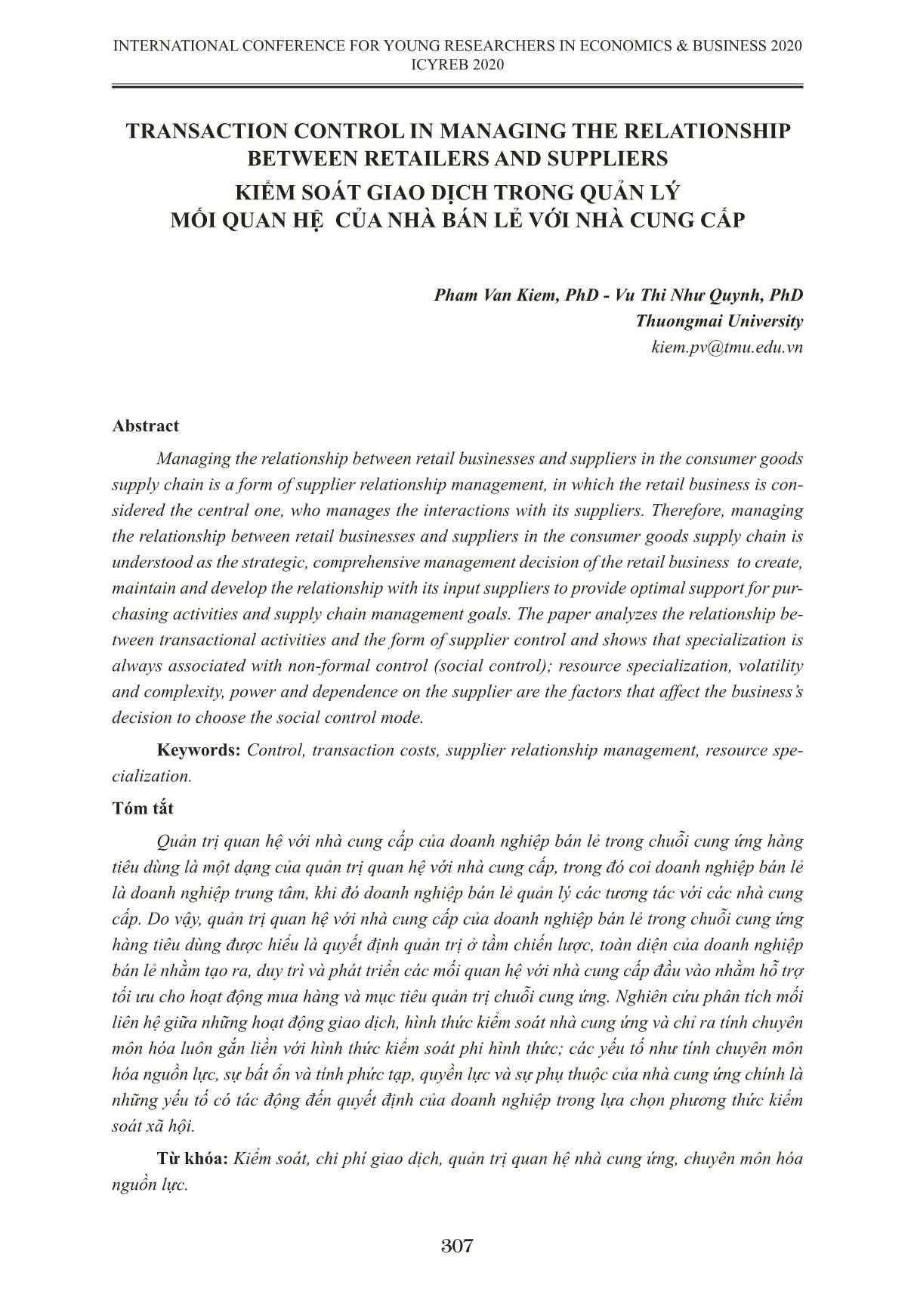
Trang 1
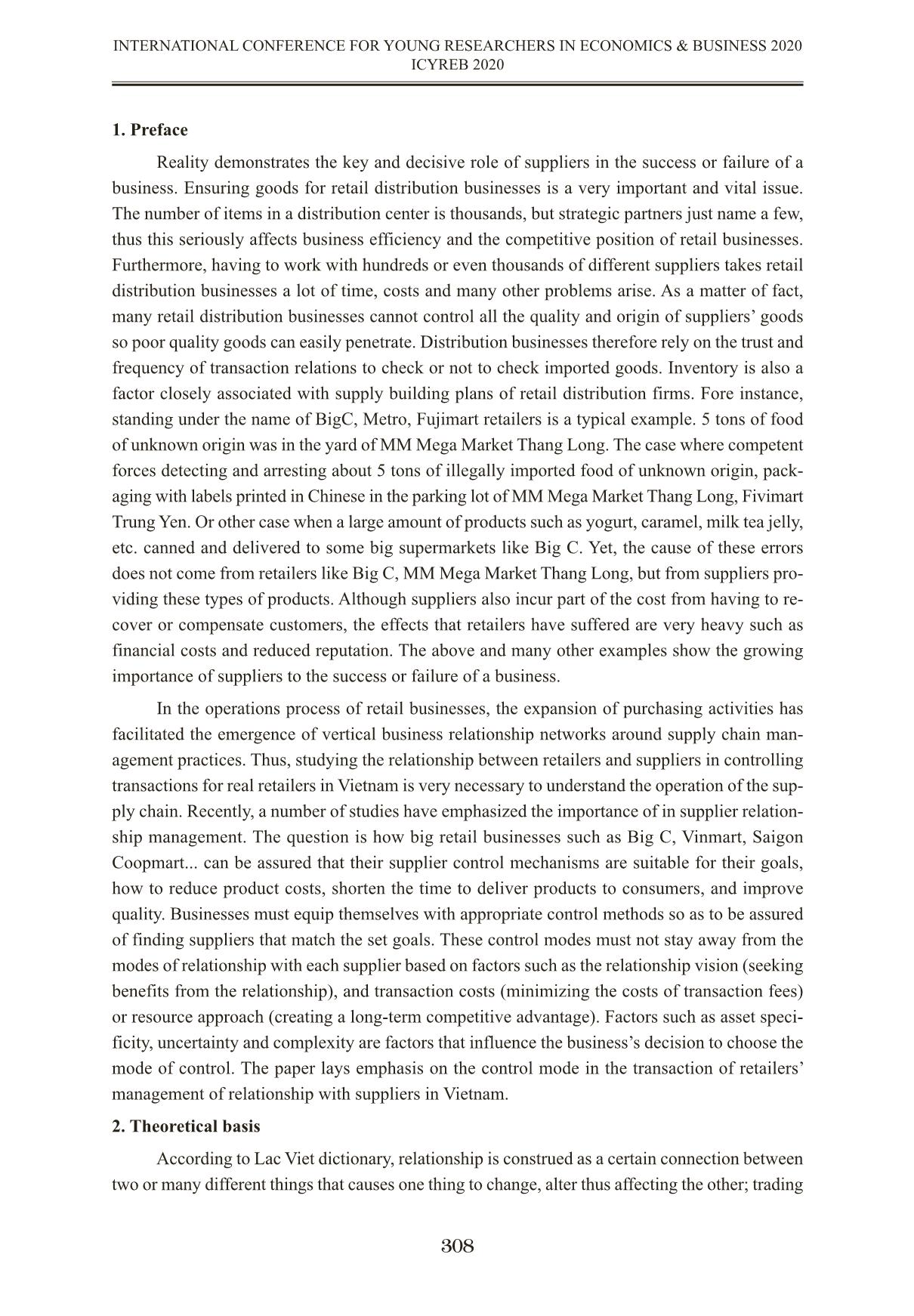
Trang 2
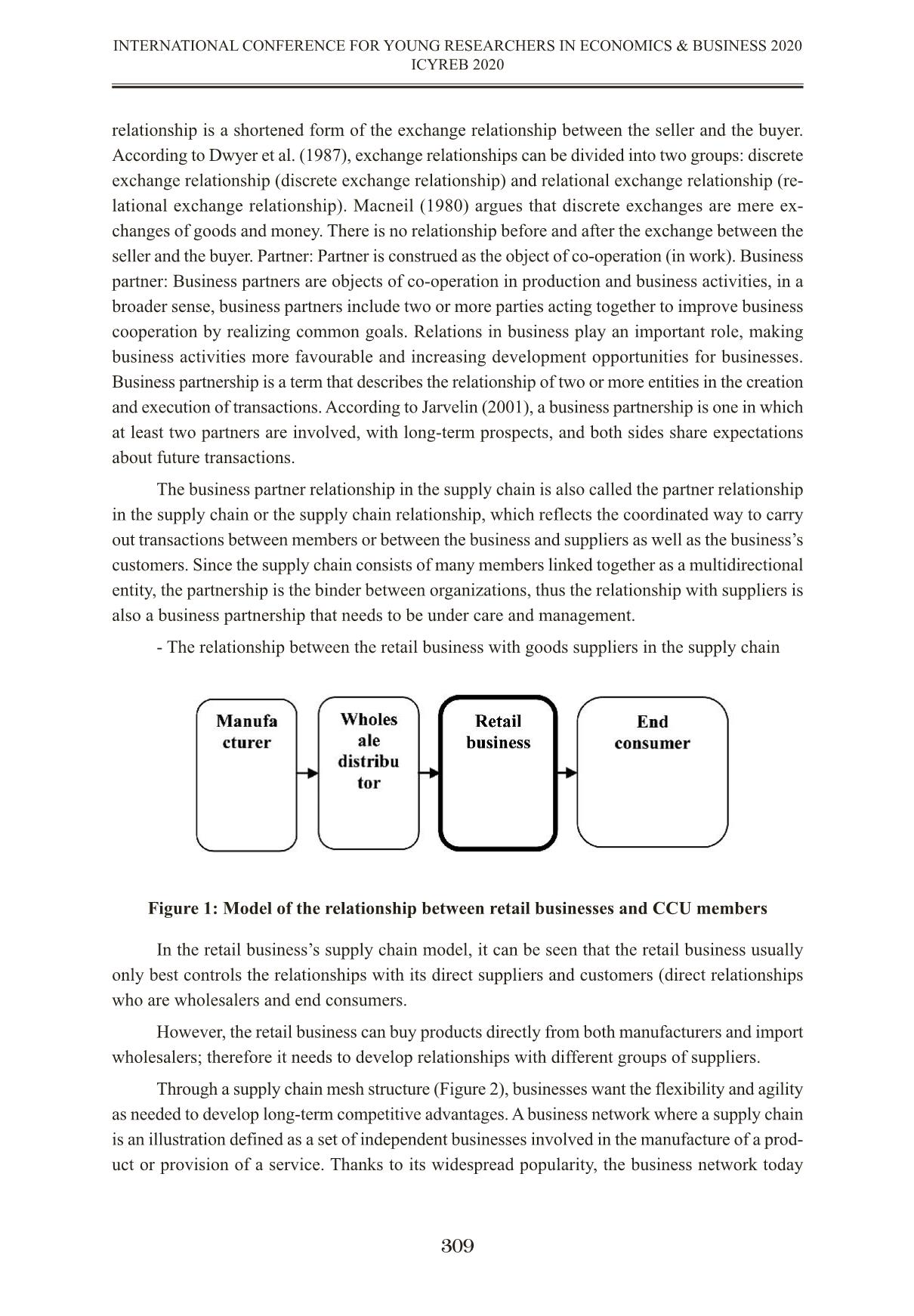
Trang 3
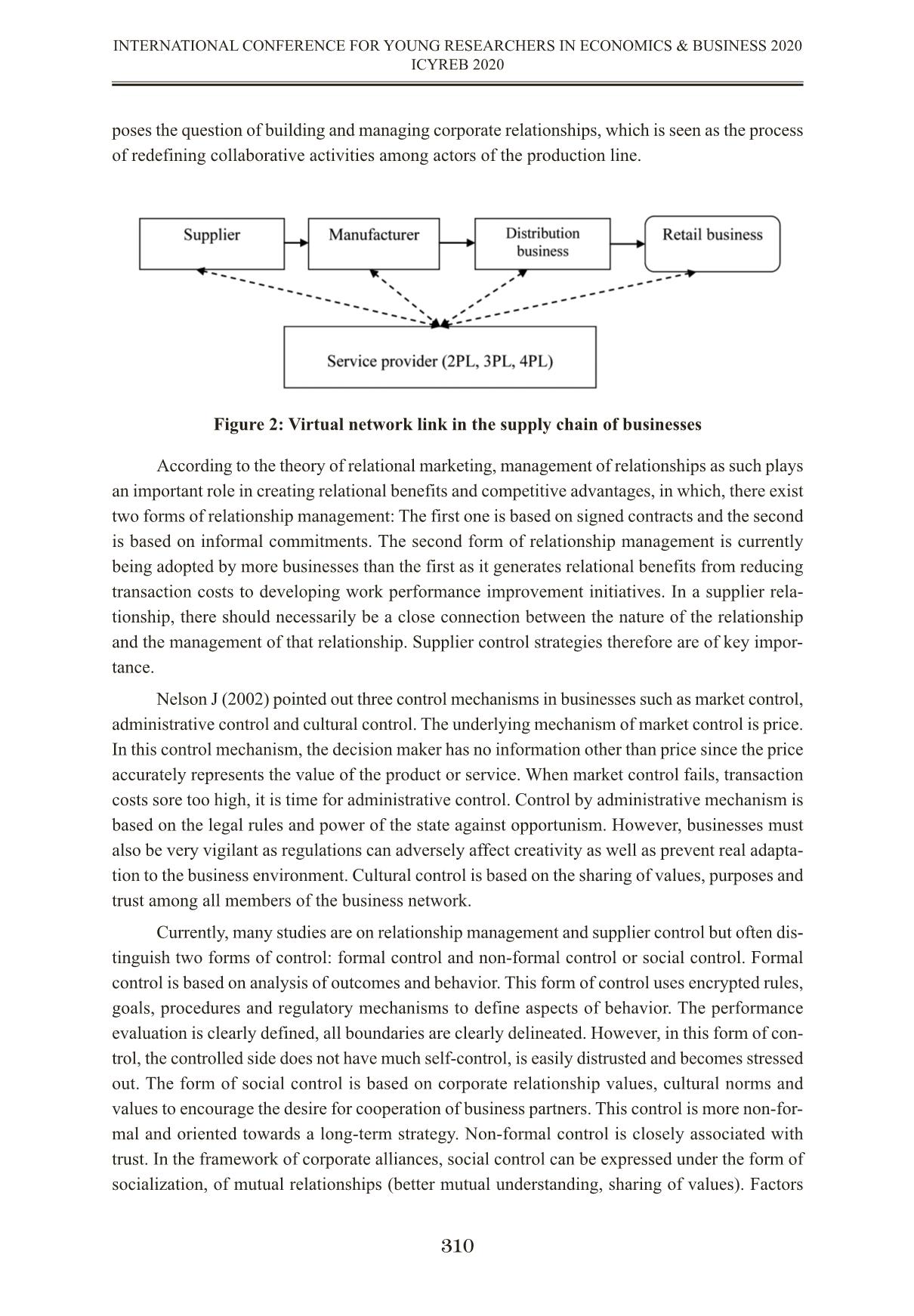
Trang 4
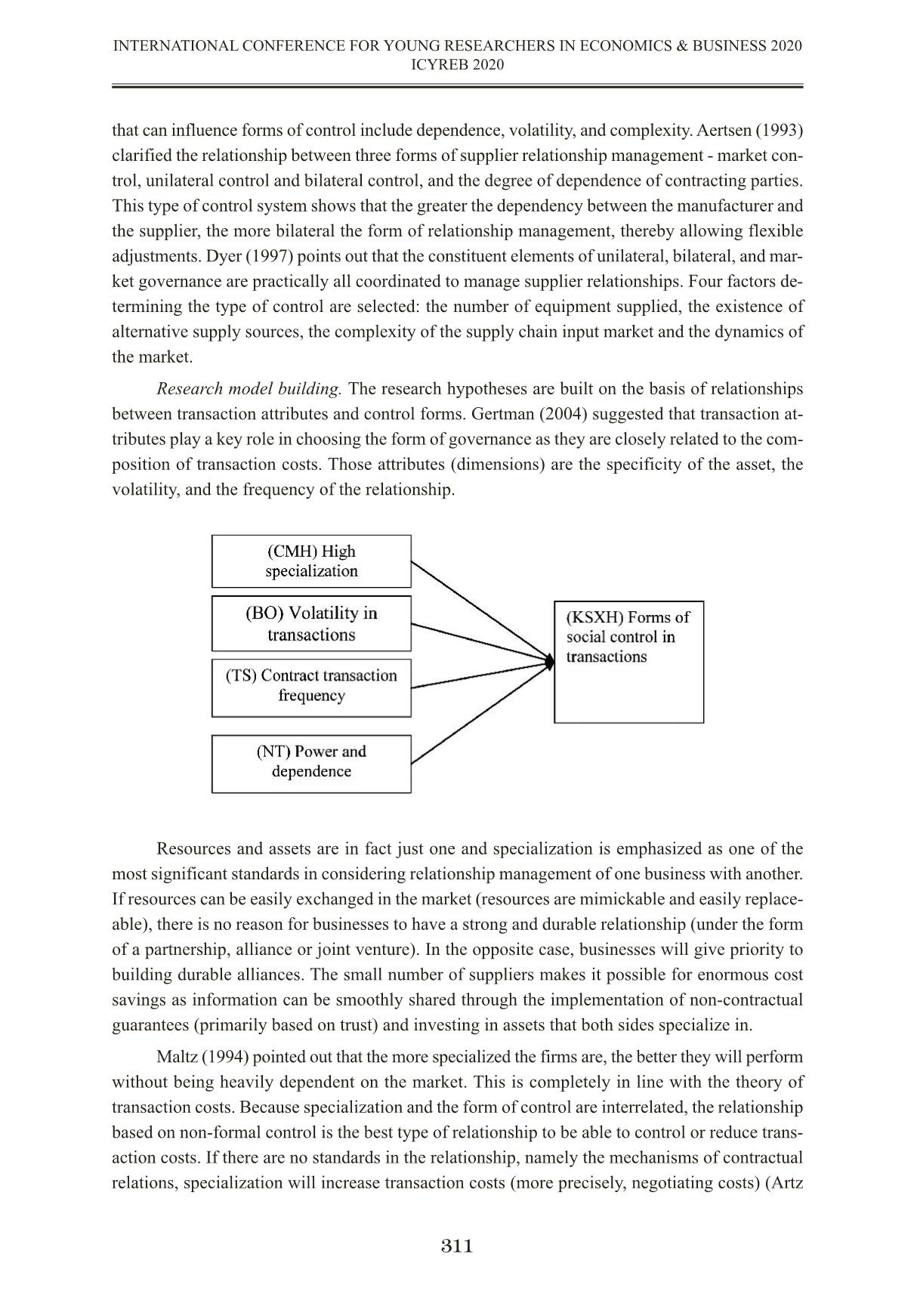
Trang 5
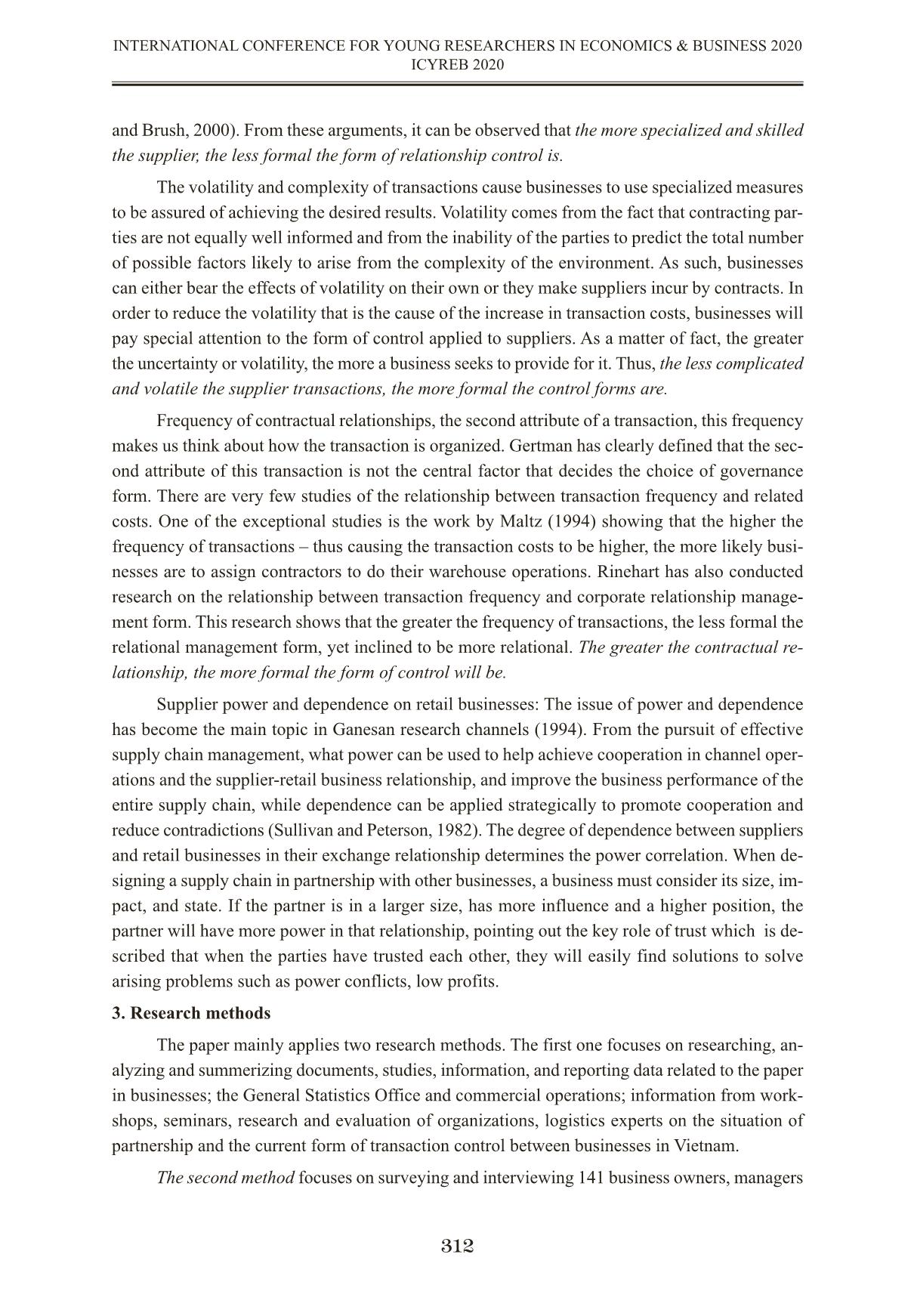
Trang 6
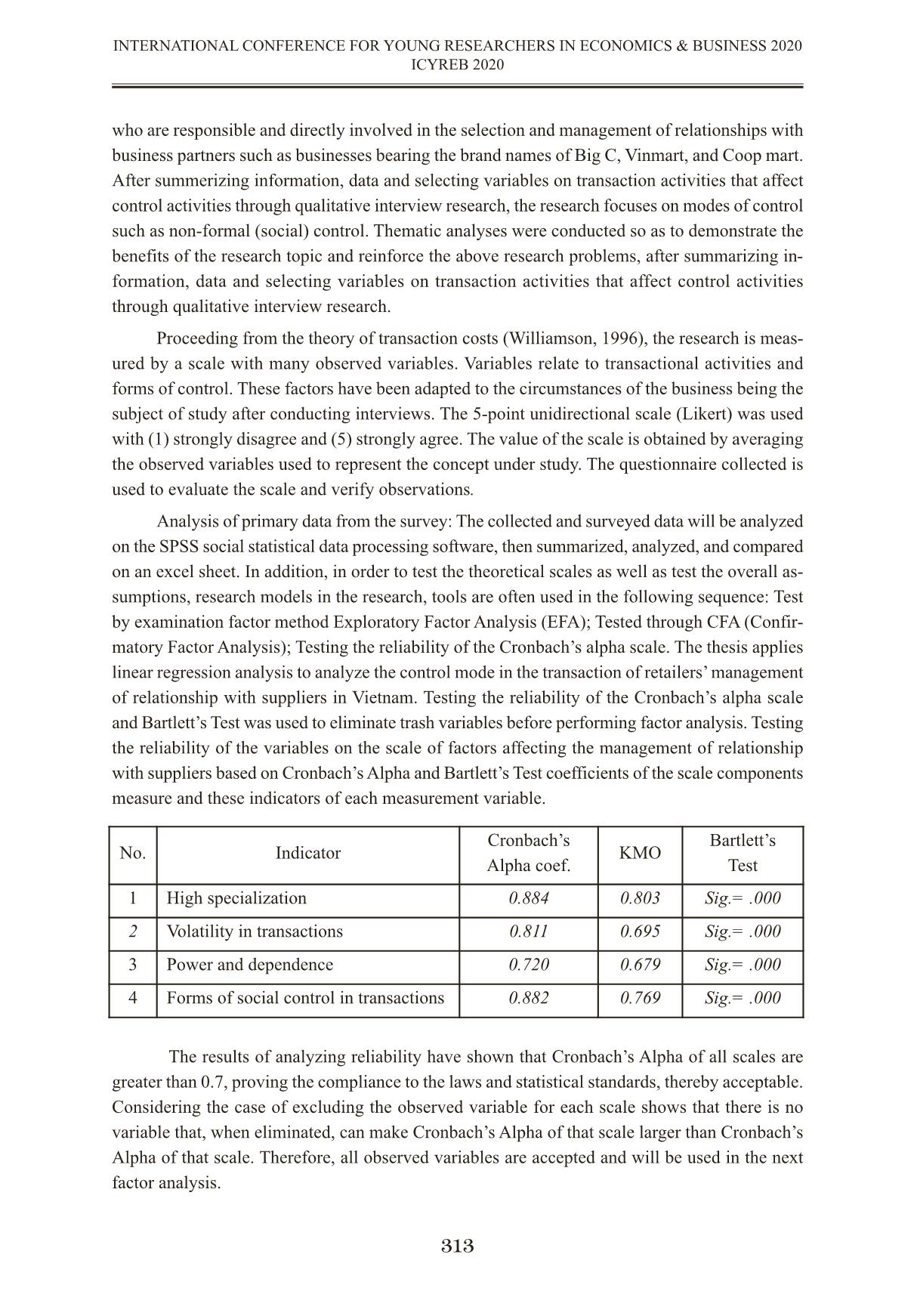
Trang 7
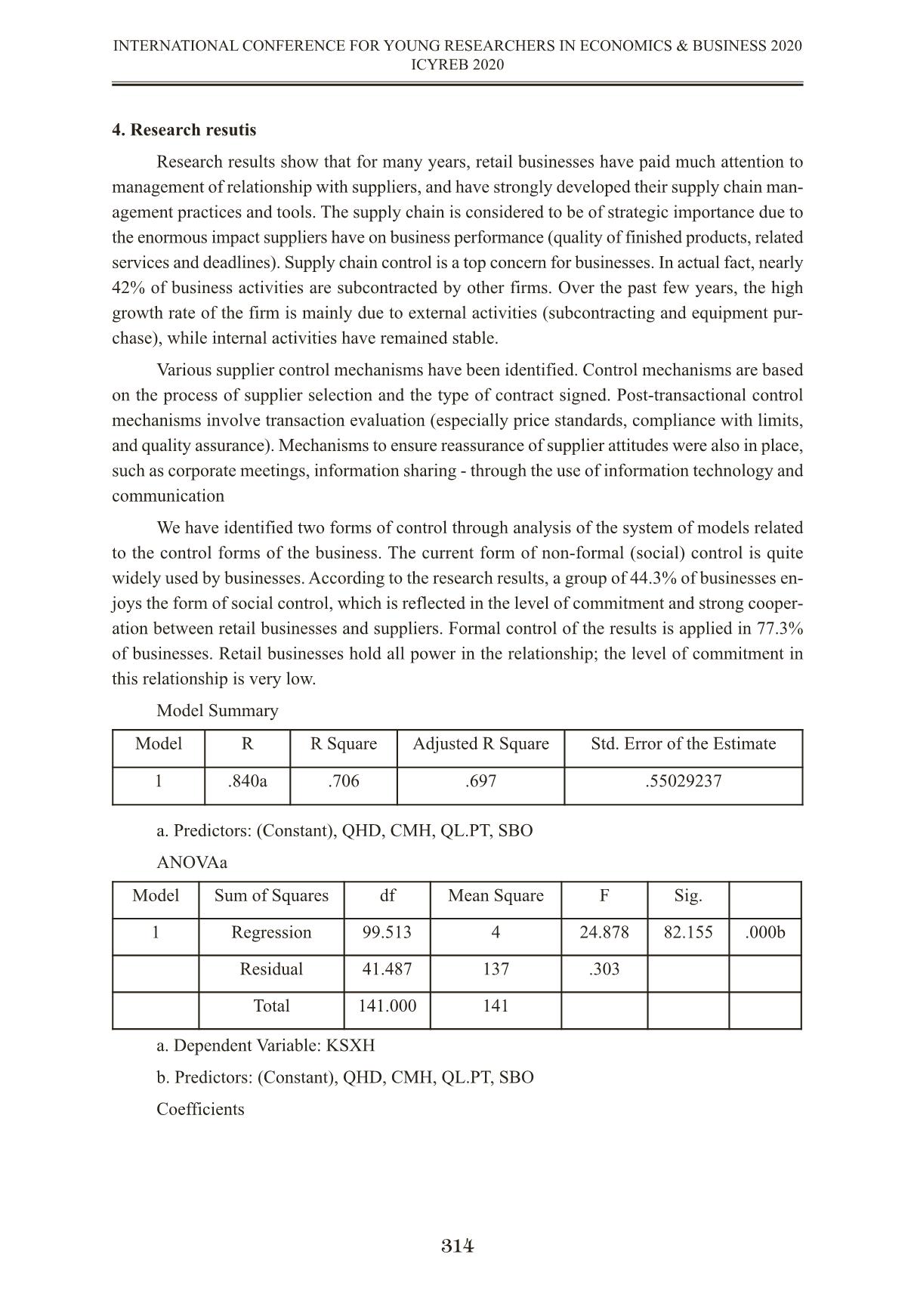
Trang 8
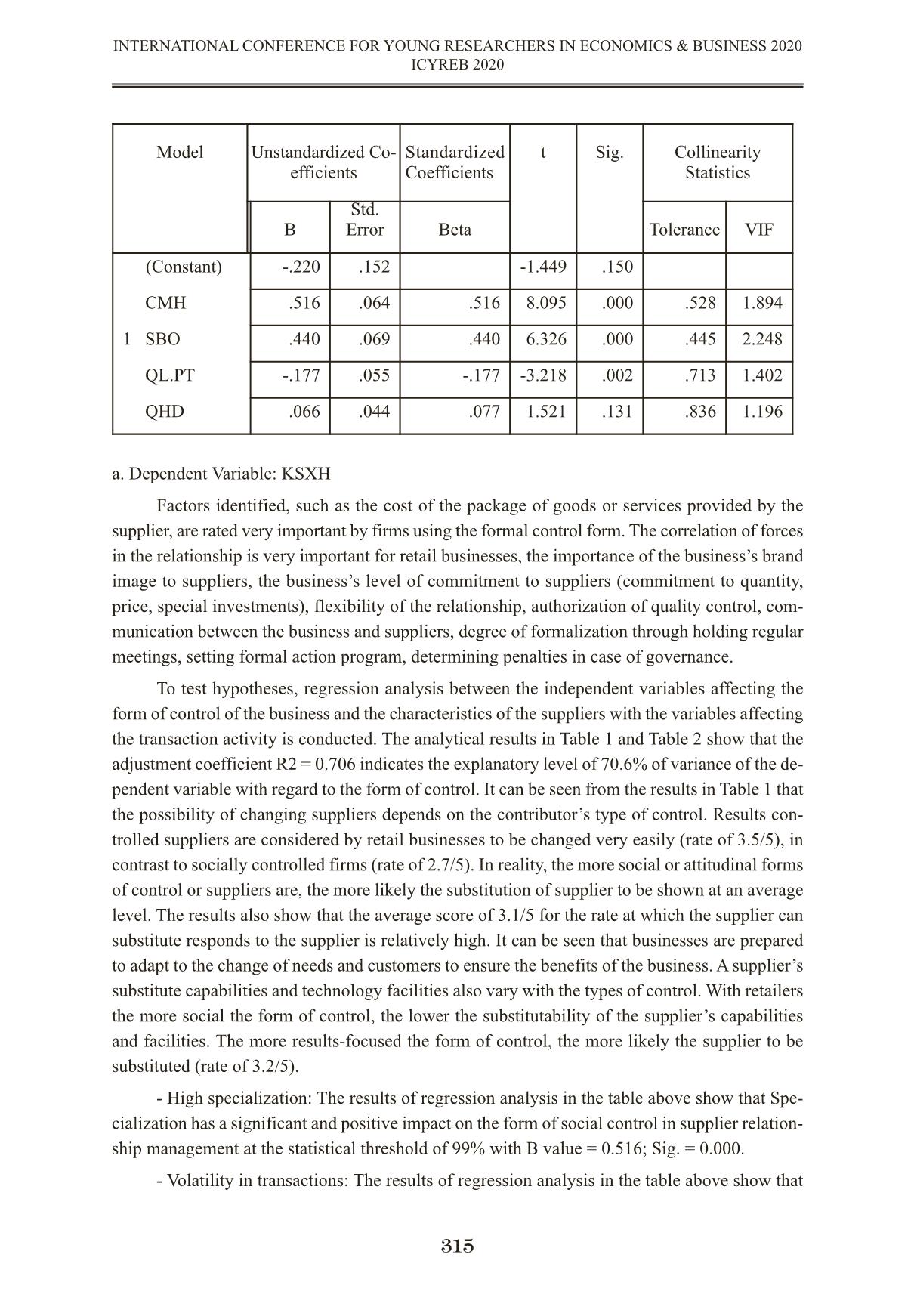
Trang 9
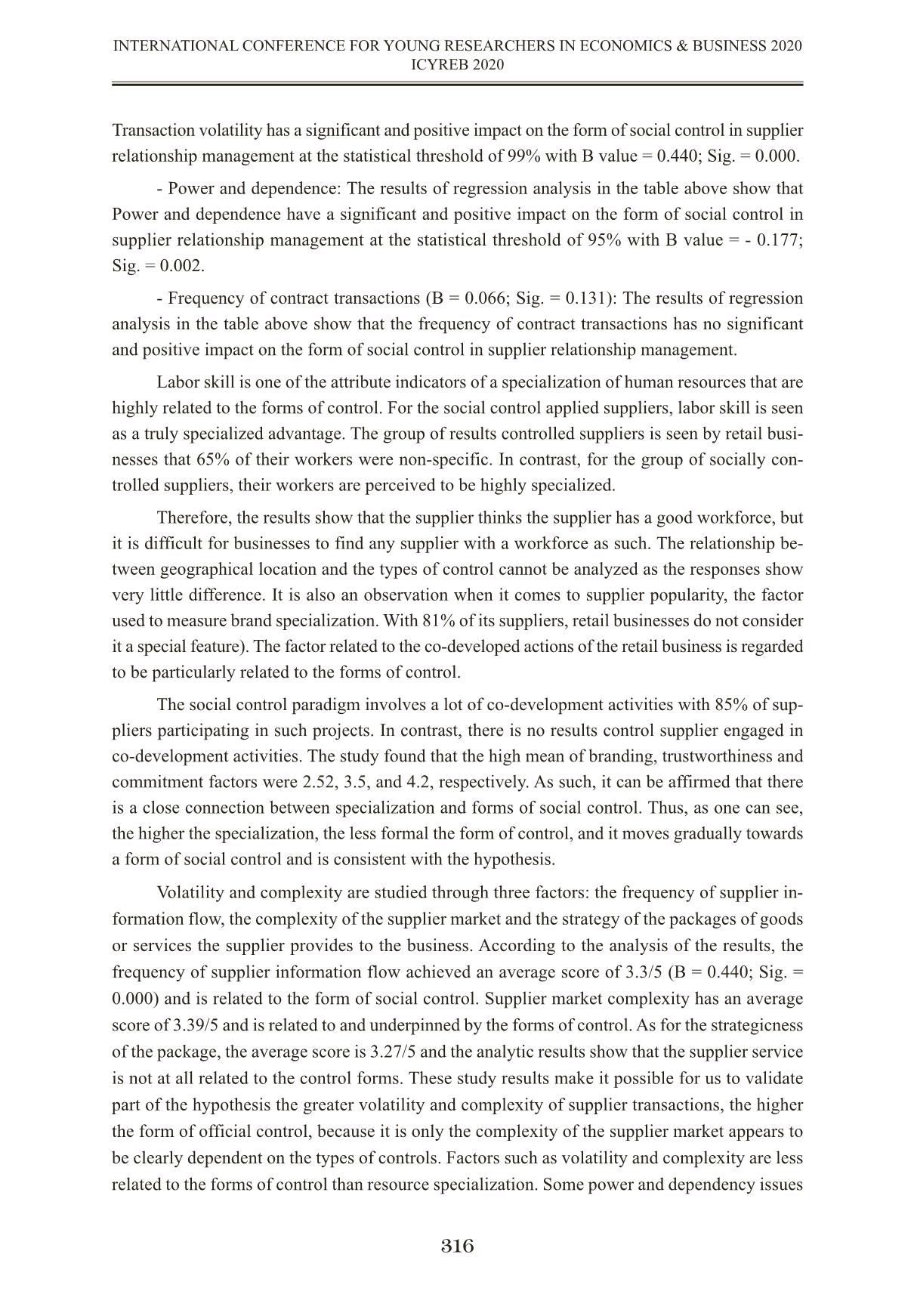
Trang 10
Tải về để xem bản đầy đủ
Tóm tắt nội dung tài liệu: Kiểm soát giao dịch trong quản lý mối quan hệ của nhà bán lẻ với nhà cung cấp
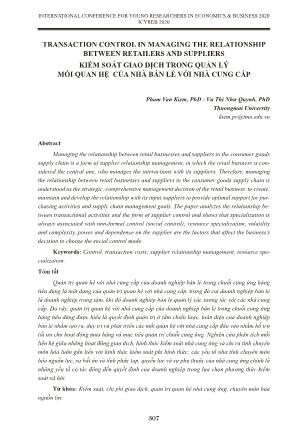
TRANSACTION CONTROL IN MANAGING THE RELATIONSHIP BETWEEN RETAILERS AND SUPPLIERS KIỂM SOÁT GIAO DỊCH TRONG QUẢN LÝ MỐI QUAN HỆ CỦA NHÀ BÁN LẺ VỚI NHÀ CUNG CẤP Pham Van Kiem, PhD - Vu Thi Như Quynh, PhD Thuongmai University kiem.pv@tmu.edu.vn Abstract Managing the relationship between retail businesses and suppliers in the consumer goods supply chain is a form of supplier relationship management, in which the retail business is con- sidered the central one, who manages the interactions with its suppliers. Therefore, managing the relationship between retail businesses and suppliers in the consumer goods supply chain is understood as the strategic, comprehensive management decision of the retail business to create, maintain and develop the relationship with its input suppliers to provide optimal support for pur- chasing activities and supply chain management goals. The paper analyzes the relationship be- tween transactional activities and the form of supplier control and shows that specialization is always associated with non-formal control (social control); resource specialization, volatility and complexity, power and dependence on the supplier are the factors that affect the business’s decision to choose the social control mode. Keywords: Control, transaction costs, supplier relationship management, resource spe- cialization. Tóm tắt Quản trị quan hệ với nhà cung cấp của doanh nghiệp bán lẻ trong chuỗi cung ứng hàng tiêu dùng là một dạng của quản trị quan hệ với nhà cung cấp, trong đó coi doanh nghiệp bán lẻ là doanh nghiệp trung tâm, khi đó doanh nghiệp bán lẻ quản lý các tương tác với các nhà cung cấp. Do vậy, quản trị quan hệ với nhà cung cấp của doanh nghiệp bán lẻ trong chuỗi cung ứng hàng tiêu dùng được hiểu là quyết định quản trị ở tầm chiến lược, toàn diện của doanh nghiệp bán lẻ nhằm tạo ra, duy trì và phát triển các mối quan hệ với nhà cung cấp đầu vào nhằm hỗ trợ tối ưu cho hoạt động mua hàng và mục tiêu quản trị chuỗi cung ứng. Nghiên cứu phân tích mối liên hệ giữa những hoạt động giao dịch, hình thức kiểm soát nhà cung ứng và chỉ ra tính chuyên môn hóa luôn gắn liền với hình thức kiểm soát phi hình thức; các yếu tố như tính chuyên môn hóa nguồn lực, sự bất ổn và tính phức tạp, quyền lực và sự phụ thuộc của nhà cung ứng chính là những yếu tố có tác động đến quyết định của doanh nghiệp trong lựa chọn phương thức kiểm soát xã hội. Từ khóa: Kiểm soát, chi phí giao dịch, quản trị quan hệ nhà cung ứng, chuyên môn hóa nguồn lực. 307 INTERNATIONAL CONFERENCE FOR YOUNG RESEARCHERS IN ECONOMICS & BUSINESS 2020 ICYREB 2020 1. Preface Reality demonstrates the key and decisive role of suppliers in the success or failure of a business. Ensuring goods for retail distribution businesses is a very important and vital issue. The number of items in a distribution center is thousands, but strategic partners just name a few, thus this seriously affects business efficiency and the competitive position of retail businesses. Furthermore, having to work with hundreds or even thousands of different suppliers takes retail distribution businesses a lot of time, costs and many other problems arise. As a matter of fact, many retail distribution businesses cannot control all the quality and origin of suppliers’ goods so poor quality goods can easily penetrate. Distribution businesses therefore rely on the trust and frequency of transaction relations to check or not to check imported goods. Inventory is also a factor closely associated with supply building plans of retail distribution firms. Fore instance, standing under the name of BigC, Metro, Fujimart retailers is a typical example. 5 tons of food of unknown origin was in the yard of MM Mega Market Thang Long. The case where competent forces detecting and arresting about 5 tons of illegally imported food of unknown origin, pack- aging with labels printed in Chinese in the parking lot of MM Mega Market Thang Long, Fivimart Trung Yen. Or other case when a large amount of products such as yogurt, caramel, milk tea jelly, etc. canned and delivered to some big supermarkets like Big C. Yet, the cause of these errors does not come from retailers like Big C, MM Mega Market Thang Long, but from suppliers pro- viding these types of products. Although suppliers also incur part of the cost from having to re- cover or compensate customers, the effects that retailers have suffered are very heavy such as financial costs and reduced reputation. The above and many other examples show the growing importance of suppliers to the success or failure of a business. In the operations process of retail businesses, the expansion of purchasing activities has facilitated the emergence of vertical business relationship networks around supply chain man- agement practices. Thus, studying the relationship between retailers and suppliers in controlling transactions for real retailers in Vietnam is very necessary to understand the operati ... regard to the form of control. It can be seen from the results in Table 1 that the possibility of changing suppliers depends on the contributor’s type of control. Results con- trolled suppliers are considered by retail businesses to be changed very easily (rate of 3.5/5), in contrast to socially controlled firms (rate of 2.7/5). In reality, the more social or attitudinal forms of control or suppliers are, the more likely the substitution of supplier to be shown at an average level. The results also show that the average score of 3.1/5 for the rate at which the supplier can substitute responds to the supplier is relatively high. It can be seen that businesses are prepared to adapt to the change of needs and customers to ensure the benefits of the business. A supplier’s substitute capabilities and technology facilities also vary with the types of control. With retailers the more social the form of control, the lower the substitutability of the supplier’s capabilities and facilities. The more results-focused the form of control, the more likely the supplier to be substituted (rate of 3.2/5). - High specialization: The results of regression analysis in the table above show that Spe- cialization has a significant and positive impact on the form of social control in supplier relation- ship management at the statistical threshold of 99% with B value = 0.516; Sig. = 0.000. - Volatility in transactions: The results of regression analysis in the table above show that 315 INTERNATIONAL CONFERENCE FOR YOUNG RESEARCHERS IN ECONOMICS & BUSINESS 2020 ICYREB 2020 Model Unstandardized Co- efficients Standardized Coefficients t Sig. Collinearity Statistics B Std. Error Beta Tolerance VIF (Constant) CMH 1 SBO QL.PT QHD -.220 .152 -1.449 .150 .516 .064 .516 8.095 .000 .528 1.894 .440 .069 .440 6.326 .000 .445 2.248 -.177 .055 -.177 -3.218 .002 .713 1.402 .066 .044 .077 1.521 .131 .836 1.196 Transaction volatility has a significant and positive impact on the form of social control in supplier relationship management at the statistical threshold of 99% with B value = 0.440; Sig. = 0.000. - Power and dependence: The results of regression analysis in the table above show that Power and dependence have a significant and positive impact on the form of social control in supplier relationship management at the statistical threshold of 95% with B value = - 0.177; Sig. = 0.002. - Frequency of contract transactions (B = 0.066; Sig. = 0.131): The results of regression analysis in the table above show that the frequency of contract transactions has no significant and positive impact on the form of social control in supplier relationship management. Labor skill is one of the attribute indicators of a specialization of human resources that are highly related to the forms of control. For the social control applied suppliers, labor skill is seen as a truly specialized advantage. The group of results controlled suppliers is seen by retail busi- nesses that 65% of their workers were non-specific. In contrast, for the group of socially con- trolled suppliers, their workers are perceived to be highly specialized. Therefore, the results show that the supplier thinks the supplier has a good workforce, but it is difficult for businesses to find any supplier with a workforce as such. The relationship be- tween geographical location and the types of control cannot be analyzed as the responses show very little difference. It is also an observation when it comes to supplier popularity, the factor used to measure brand specialization. With 81% of its suppliers, retail businesses do not consider it a special feature). The factor related to the co-developed actions of the retail business is regarded to be particularly related to the forms of control. The social control paradigm involves a lot of co-development activities with 85% of sup- pliers participating in such projects. In contrast, there is no results control supplier engaged in co-development activities. The study found that the high mean of branding, trustworthiness and commitment factors were 2.52, 3.5, and 4.2, respectively. As such, it can be affirmed that there is a close connection between specialization and forms of social control. Thus, as one can see, the higher the specialization, the less formal the form of control, and it moves gradually towards a form of social control and is consistent with the hypothesis. Volatility and complexity are studied through three factors: the frequency of supplier in- formation flow, the complexity of the supplier market and the strategy of the packages of goods or services the supplier provides to the business. According to the analysis of the results, the frequency of supplier information flow achieved an average score of 3.3/5 (B = 0.440; Sig. = 0.000) and is related to the form of social control. Supplier market complexity has an average score of 3.39/5 and is related to and underpinned by the forms of control. As for the strategicness of the package, the average score is 3.27/5 and the analytic results show that the supplier service is not at all related to the control forms. These study results make it possible for us to validate part of the hypothesis the greater volatility and complexity of supplier transactions, the higher the form of official control, because it is only the complexity of the supplier market appears to be clearly dependent on the types of controls. Factors such as volatility and complexity are less related to the forms of control than resource specialization. Some power and dependency issues 316 INTERNATIONAL CONFERENCE FOR YOUNG RESEARCHERS IN ECONOMICS & BUSINESS 2020 ICYREB 2020 have negative impact on the form of control as companies are often measured by some specific indicators that are easier to return goods when related to suppliers larger than the companies and vice versa; it is easier for the companies to negotiate prices when related to larger suppliers and vice versa; it is easier for the companies to return goods when related to suppliers larger than the companies. 5. Conclusion and recommendations The research paper demonstrates the link between transactional activities and forms of so- cial control in supplier relationship management of retail businesses, thus contributing to better understanding of business-to-business (B2B) relationships. The results obtained from this research work can make it possible for retail businesses to properly adjust their types of supplier relation- ship controls depending on transaction cost attributes. In practice, reducing transaction costs or increasing benefits from relationships is represented by a sound governance structure. A supplier relationship control structure inappropriate for the transactional context, namely by the nature of the commercial relationship, will have a negative impact on corporate performance. Retail busi- nesses must be aware of the relevant correspondence between the modes of transaction and those of supplier relationship controls. In a supplier relationship, a primary prerequisite is to determine the appropriately applied type of control. In reality, sometimes the purchasing department does not fully analyze the built-up rela- tionship with the business’s suppliers. The definition of this type of control is not dignified yet, it is not integrated into the overall steps in supplier relationship management or in other words defining the type of control that is only exercised for form’s sake, historically or habitually. For example, a supplier, who is not engaged activities in coordination with the retail business, com- municates little information and is not authorized to control quality, will be subject to results con- trol. Conversely, if the supplier is very committed to the relationship with the retail business, there is a balanced correlation and frequent information exchange will enjoy some form of social control. After defining the types of control, its alignment should be guaranteed, i.e. to analyze the correspondence of the control form with the specialization of the business’s resources and uncertainty. Investigation results show that the form of control and supplier transaction operations may appear incompatible. In the case of a supplier whose attitudes are controlled with little commit- ment to co-development activities, if the business wants the supplier to participate more in such coordinated activities, it has to change the form of control towards gradually social control. The more strategic possibilities retail businesses want to have, the more they have to choose a form of social control to ensure an acceptable level of transaction costs. The problem is how businesses will have to change the management form with their suppliers. This also emphasizes the impor- tance of varying forms of supplier control. The form of control that businesses use at present may become no more relevant in the future as needs and influencing factors change. Strengthening specialization and balancing power and dependence in operations of suppliers to ensure produc- tion and business activities are conducted to match the requirements of the business. The paper gives a number of recommendations from state management agencies: The State 317 INTERNATIONAL CONFERENCE FOR YOUNG RESEARCHERS IN ECONOMICS & BUSINESS 2020 ICYREB 2020 should support businesses in supplier relationship management through the organization of train- ing courses and workshops on supplier relationship management in the context of economic re- gionalization and globalization. Completing the relevant legal system. It must be said that the provisions in the relevant legal documents of Vietnam are quite complete and detailed. However, in the context of economic integration, the State also needs to consider and make reasonable legal adjustments to suit the new situation. Strengthening information, increasing businesses’ awareness of the importance of supplier relationship management. Since Vietnam became an official member of the WTO and with the formation of many large economic groups in the country, supplier relations have become an issue of concern. Departments, boards, sectors provide training on new knowledge, techniques and new tech- nologies in business management and operations, providing and disseminating new information to workers in the commercial industry... Increasing consumer awareness and pressure on the relationship between retail businesses and suppliers. As mentioned above, the consumer is the origin of the business. Suppliers and retail businesses build and develop partner relationships for the ultimate purpose of best satisfying customers’ needs. Therefore, the government’s policies to protect and raise consumer awareness are an indirect solution to promote the supplier-retail business relationship, which will motivate businesses to carefully choose qualified suppliers who can best meet their request, and also from that retail businesses will cooperate more actively with their suppliers. This study still has certain limitations. Firstly, that the specialization of the supplier’s re- sources affecting the form of control and the supplier’s volatility and complexity only partially affects the control decision according to research results is guaranteed. However, the magnitude of the effect is not guaranteed because the scope of the study is only confined within the retail industry. To ensure certainty, there needs be a broader study covering many different disciplines. Next, the study was just limited to non-formal (social) control, rather than being broken down to other forms of control such as attitude control and mutation control. REFERENCE 1. An Thị Thanh Nhàn (2010), “Quản lý hiệu quả các mối quan hệ trong chuỗi cung ứng”, Tạp chí Công Nghiệp, tr. 25-27. 2. Artz K.W. et Brush T.H. (2000), « Asset Specificity, uncertainty and relational norms : an examination of coordination costs in collaborative strategic alliances », Journal of Economic Behavior and Organization, vol. 41, n° 4, pp. 337-362. 3. Cannon J.P. et Perreault W.D. (1999), « Buyer- Seller Relationships in Business Markets », Journal of Marketing Research, vol. 36, n° 4, pp. 439-460 4. Đỗ Ngọc Mỹ và Đặng Văn Mỹ (2008), “Quan hệ hợp tác giữa các nhà sản xuất và nhà 318 INTERNATIONAL CONFERENCE FOR YOUNG RESEARCHERS IN ECONOMICS & BUSINESS 2020 ICYREB 2020 phân phối trong lĩnh vực hàng tiêu dùng: nghiên cứu thăm dò”, Tạp chí khoa học và công nghệ, Đại học Đà Nẵng. Số 3(26, tr. 145-154. 5. Dyer J.H. et Singh H (1998), «Therelational view: cooperative strategy and sources of interorganizational competitive advantage », Academy of Management Review, vol. 23, n°4, pp. 660-679. 6. Heide J.B. (1994), «Interorganizational Governance inMarketingChannels », Journal of Marketing, vol. 58, n°1, pp. 71-85. 7. Jérémie cappellano (2007), Supplier Relationship Management: Pratiques, attentes et besoins des services Achat dans l’Industrie Française. 8. Joskow P.L. (1991), « Asset specificity and the structure of vertical relationships : em- pirical evidence », The nature of the firm, Oxford University Press, pp. 117-137 9. L. M. Leftwich, J. A. Leftwich và N. Y. Moore et al (2004), Organizational concepts for purchasing and supply management implementation, Santa monica, CA:Rand corporation 10. Maltz A. (1994), « Outsourcing the warehouse function: Economic and strategic con- siderations », Logistics and Transportation Review, vol. 30, n° 3, pp. 245-265. 11. Morris M. et Carter C. (2005), « Relationship Marketing and Supplier Logistics Per- formance: An Extension of the Key Mediating Variables Model », Journal of Supply chain man- agement, vol. 41, n° 4, pp. 32-43. 12. Nguyễn Văn Minh, Phạm Văn Kiệm (2014), Hoạt động kiểm soát trong quản trị quan hệ nhà cung ứng ngành công nghiệp ô tô, Tạp chí khoa học thương mại, Đại học thương mại, số 73, p52-59. 13. Ouchi W. G (1977), « The Relationship between Organizational Structure and Organi- zational Control », Administrative Science Quarterly, vol. 22, n° 1, pp. 95-113. 14. Phạm Văn Kiệm (2014), Nghiên cứu quan hệ phối hợp giữa nhà phân phối và nhà cung cấp nhằm tăng hiệu quả kinh tế, Tạp chí Kinh Tế - Kinh doanh, Đại học kinh tế- Đại học quốc gia Hà Nội, số 03, p17-25 . 15. Valérie fernandes (2007), “Gestion de la relation fournisseurs: étude des relations entre les modes de contrôle et les dimensions des transactions”, Reveiw comptabilité–contrôle–audit, tr. 53-74 16. Wathne K.H. et Heide J.B. (2004), « Relationship Governance in a Supply Chain Net- work», Journal of Marketing, vol. 68, n° 1, pp. 73-89. 17. Williamson O.E. (1996), The Mechanisms of Governance, Oxford University Press, New York, pp. 58-61. 319 INTERNATIONAL CONFERENCE FOR YOUNG RESEARCHERS IN ECONOMICS & BUSINESS 2020 ICYREB 2020
File đính kèm:
 kiem_soat_giao_dich_trong_quan_ly_moi_quan_he_cua_nha_ban_le.pdf
kiem_soat_giao_dich_trong_quan_ly_moi_quan_he_cua_nha_ban_le.pdf

